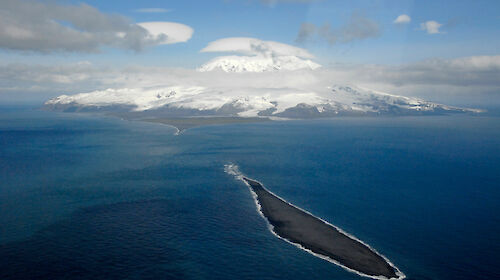"In the past 40 years Australian scientists have only occasionally visited Heard Island, which is one of the most remote and wild places on earth, dominated by Big Ben, Australia's only active volcano." Dr Tony Press, Director of the Australian Antarctic Division, said today.
"The current research expedition to Heard Island will significantly increase our knowledge of the island and the biological and physical processes occurring there. This research is a major part of an international effort to develop a reliable means of detecting and measuring environmental change."
Sub-Antarctic islands, and Heard Island in particular, provide ideal settings for this type of work. Heard Island has minimal human interference, with no known introduced animals or plants, and studying changes to its glaciers gives a ready means of detecting changes in air temperature.
Rehabilitation work will also be undertaken – at the ruined research station at Atlas Cove, the site of an Australian research station from 1947 to 1955. The major rehabilitation task is the collection and disposal of scattered debris in the vicinity of the station including remnants of buildings destroyed by the harsh weather.
Heard Island was also a significant place of early sealing activity from 1855 to 1881 and was placed on the World Heritage List in 1997 for its outstanding natural universal values.
"Heard Island is such a special place that our activities there must be conducted to the highest environmental standards," Dr Press said.
Low impact temporary field camps will be established to provide expeditioners with accommodation and communal facilities. The camps will comprise living units which are modified cylindrical polyethylene rainwater tanks, the design being selected for durability, low cost and portability. They can be slung underneath a helicopter and towed by small inflatable boat and are sufficiently lightweight to be lifted into position by members of the expedition.
The infrastructure will be removed from the island at the end of this season's program with the exception of a few huts which will remain as emergency refuges.
MV Polar Bird is scheduled to sail from Fremantle North Quay No. 2 at 1700 on Saturday 7 October.

